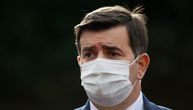Djerlek: Covid situation is complex in Serbia, it could become worrying in a month
He repeated the appeal for as many people as possible to get vaccinated and in that way prevent a difficult fall
State Secretary in the Ministry of Health Mirsad Djerlek has told RTS that the current epidemiological situation in Serbia is complex and that it could become worrying in a month. He said that it is very risky not to be vaccinated and wait for the Delta strain in the fall. He explained which citizens are recommended to receive the third dose of the vaccine, but also pointed out that anyone can apply and get the third dose.
When it comes to the current epidemiological situation, Mirsad Djerlek says that it is very complex and could become worrying in a month.
"It's is evident that with sunny days and vacations people have forgotten that coronavirus is present and that they have forgotten that we need to be vaccinated. They mainly focused their attention on vacations and relaxed," he said.
He stressed that he can understand that after 15 months of living under stress.
"On the other hand, I cannot support it for two reasons. One is - to go on vacation unvaccinated and mix with citizens of other European countries where the current epidemiological situation is very bad, means there's a great possibility of getting infected and that is very dangerous. On the other hand, to await the Delta strain and September unvaccinated is very risky," said Djerlek.
He repeated the appeal for as many people as possible to get vaccinated and in that way prevent a difficult fall.
When it comes to the third dose of the vaccine, the Expert Committee has made its recommendation.
"We are all preparing to calmly welcome the fall and think about guarding our health, and I think that a large portion of citizens are acting as they should, and the third dose is something we need especially for certain categories of the population," said Djerlek.
He stressed that these are chronic patients, patients with malignant diseases, those who have received transplants, especially those with bone marrow transplants, elderly patients over 70, patients older than 60 in nursing homes, employees in health and social services.
"We must make it clear that all citizens have the right to apply and receive the third dose, where there has not been the expected immune response," Djerlek added.
Asked whether the recommendation is to receive the same vaccine, Djerlek says that the recommendation is that the third dose should be the Pfizer, or the Moderna vaccine, which will arrive in the fall.
"But that does not mean that we can't choose any of the four vaccines approved by our drug agency," said Djerlek.
When asked why Pfizer and Moderna, Djerlek said that the tests that have been done on a large sample in the world and based on the experience of the Expert Committee showed that they provide a faster immune response.
"However, all other vaccines are of high quality and we cannot ignore them," Djerlek stressed.
Speaking about mandatory vaccination of healthcare workers, Djerlek said that they should show an example and responsibility and that they cannot treat people if there is a possibility of infecting them.
"On the other hand, we cannot allow people who come and have negative antigen tests to infect health workers," said Djerlek.
He emphasized that he is in favor of introducing mandatory vaccination of health workers.
"The state will not impose blanket mandatory vaccination of the population, we will continue to let people choose whether they will be vaccinated or not, and that goes on their conscience and responsibility," concluded Djerlek.
(Telegraf.rs)

